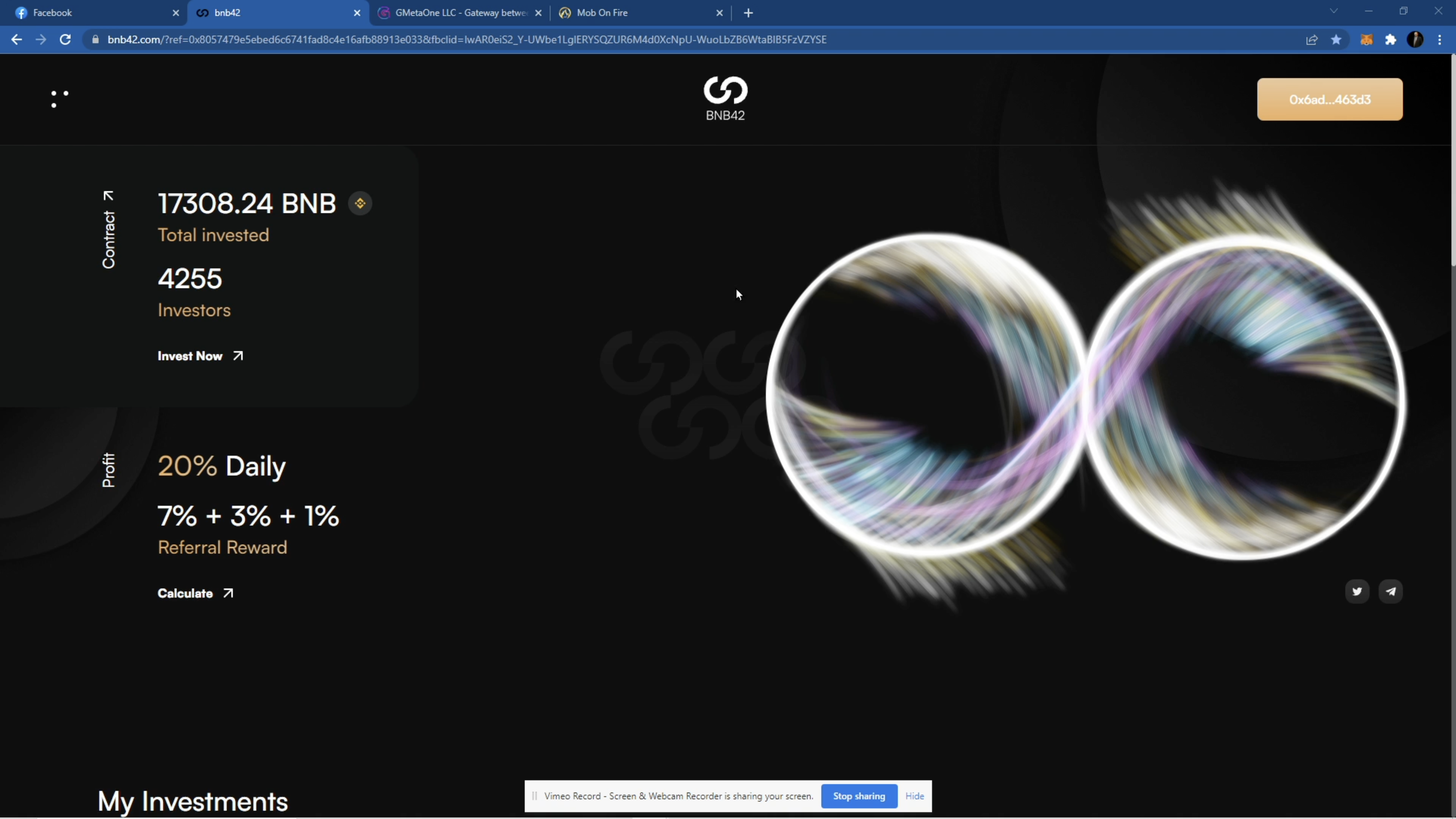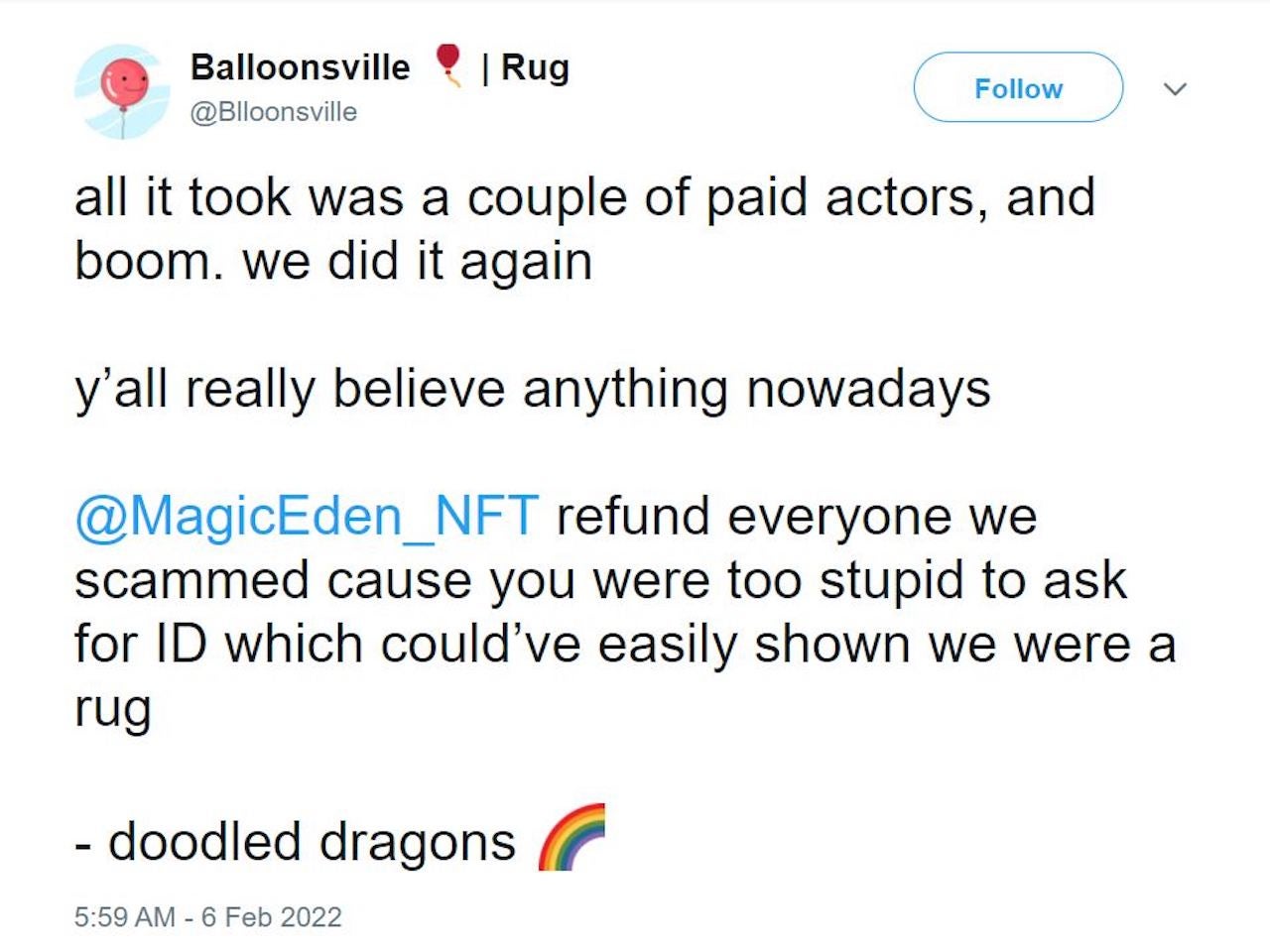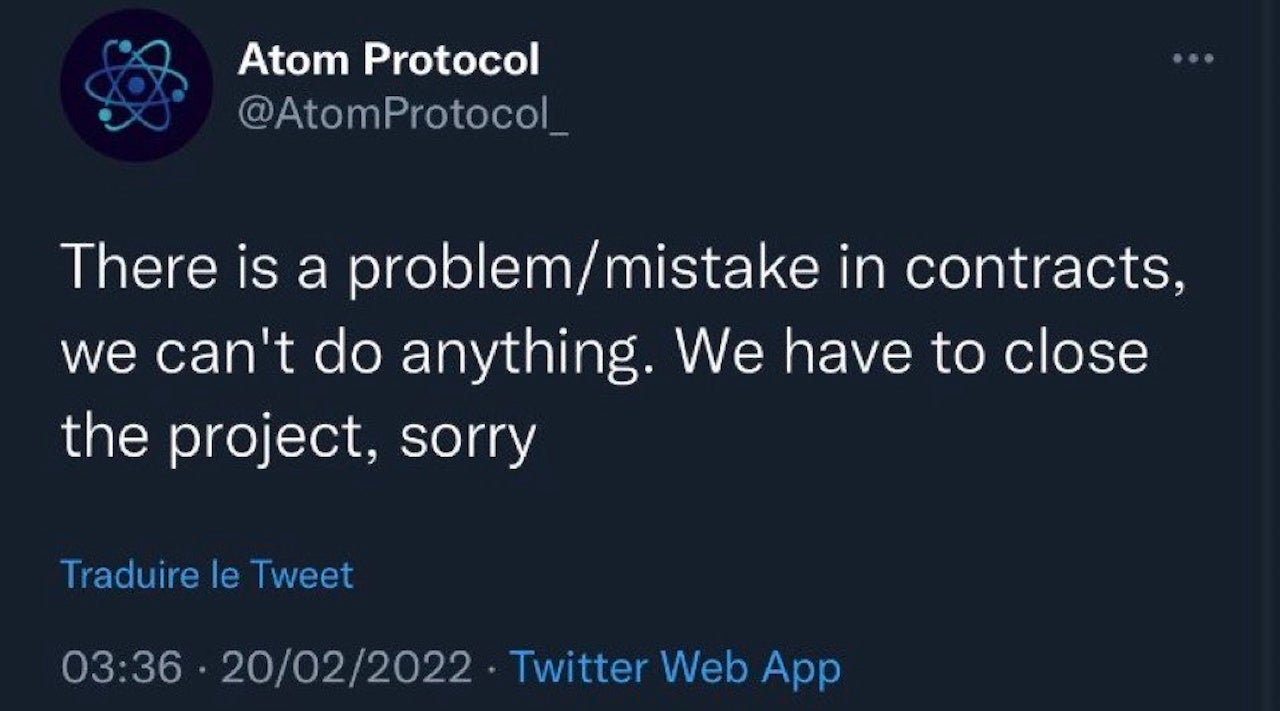The world of cryptocurrencies and NFTs is filled with scammers. And every month there seems to be more and more hucksters launching new crypto tokens and shilling ripoff apes.
Last month some of the biggest crypto scammers made off with over $US4 ($6) million, and we showed you the biggest and weirdest scams of January. This month is no different. In fact, over $US8.5 ($12) million was taken by scammers in some of the biggest NFT and crypto frauds of February.
Today we’re looking at some of the biggest rug pulls of the past month — cryptocurrencies and NFT projects set up by people who then made off with all the money that was invested. And this list doesn’t even include projects that got hacked, like when hackers stole $US1.7 ($2) million in NFTs from OpenSea earlier this month. This is just the projects that were out and out frauds from the beginning. And sadly, we expect plenty of scams next month as well.
BNB 42 ($US2.7 ($3.72) million)

You know what they say about things that sound too good to be true. They usually are.
The cryptocurrency project BNB 42 promised 100% profits after 10 days to anyone who bought their coin , something that obviously wasn’t real or sustainable. About 6,000 people invested in the project before it was rugged. The scammers behind BNB 42 made off with roughly $US2.7 ($3.72) million, according to crypto monitoring firm Peck Shield.
The Twitter account is wiped and the website is gone, now parked by GoDaddy. And while the website is now offline, you can see what it looked like thanks to the Wayback Machine and videos that showed people how to buy in to the scam.
Baby Musk Coin ($US2 ($3) million)

The scammers behind a new cryptocurrency coin called Baby Musk Coin raised $US2 ($3) million in a so-called initial coin offering. What’s an initial coin offering? It’s like an IPO but for fake money.
The crypto scam was named after the wealthiest person in the world, Elon Musk, who has been known in the past to promote bitcoin and dogecoin. But Musk had nothing to do with this particular project.
A press release from the project that’s still available on Yahoo Finance claimed that a man named Grant Liu was the CEO of Baby Musk Coin. But Liu is almost certainly not a real person.
The Baby Musk Coin website is gone, but you can still see an archived version at the Wayback Machine. Incredibly, the website claimed Baby Musk Coin was “unruggable.”
As the website explained before it was deleted:
BabyMusk is a tribute coin to Elon Musk. Its community has one main goal: to catch Elon’s attention such that he will join the project. He is Hyper-deflationary with an integrated smart staking system built in to reward you in BTC that are being automatically added to your wallet each transaction. Simply hold BabyMusk in your wallet and watch your BTC grow.
So much for that.
Lana Rhoades NFTs ($US1.8 ($2) million)

Porn actress Lana Roades launched an NFT collection called CryptoSis before reportedly abandoning the project and draining most of the funds.
Roades has apparently made off with roughly $US1.8 ($2) million, according to the blog Web3 Is Going Great. And things aren’t going great for anyone who purchased the cartoon jpegs, obviously.
Rhoades has since deleted her Twitter account, but denied the project was a scam, according to screenshots captured by the crypto news site Decrypt. But it sounds like she’s not giving any of the money back. It’s going to her “development team” according to since-deleted tweets.
Jacked Ape Club ($US1.4 ($2) million)

You know that NFT project, the Bored Ape Yacht Club? What if that, but like…. all the apes were jacked?
When the Jacked Ape Club launched, it promised 8,888 NFTs for sale, drawing inspiration from the biggest NFT collection in existence, the Bored Ape Yacht Club. But these apes were jacked, you see — muscle-bound apes that were swole as hell. Unfortunately for people who invested, it all came crashing down.
When just 3,200 of the NFTs sold, the founders “burned” the remaining supply, while telling everyone the project had completely sold out. Then, 13 different wallets received big payouts totaling $US1.4 ($2) million worth of crypto, leaving just $US530 ($736) in the project.
A cofounder on the project, who goes by the name Dylan, insists his project wasn’t a scam, but acknowledges he got a big payout. That payout, he insists, went to salaries. Dylan, however, says he’s “no longer associated with the project.”
Balloonsville ($US590,000 ($819,038))

The scam artists behind an NFT project called Balloonsville made off with at least $US590,000 ($819,038) this month, and it wasn’t their first rodeo.
As the blog Web3 Is Going Just Great points out, this scam was pulled off by the people behind Doodled Dragons, which took home over $US30,000 ($41,646) last month.
The crypto news site NFT Evening has screenshots from the Twitter account, where the hucksters take credit for their deception, claiming that “y’all really believe anything nowadays.” They even claim to have used paid actors, something Gizmodo could not independently verify.
Atom Protocol

Atom Protocol’s Twitter has disappeared but its last tweet claimed there was a “problem” with the projects contracts. The problem appears to have been that whoever was behind the project wanted to steal everyone’s money.
Strangely, Atom Protocol received “certification” from KYC (Know Your Customer) by Assure, an NFT project that tries to give validity to other projects by ensuring they’re trustworthy. We know how much that was worth, obviously. Nothing.
It’s unclear how much money the scammers were ultimately able to get away with, but there are plenty of people on social media who say they lost money. Just because a project appears to have been “verified” doesn’t mean it’s not a scam.
Tekika NFTs

When the Tekika NFT project launched on the Magic Eden marketplace in December it attracted anime fans with its colourful and edgy designs. But that excitement wouldn’t last long.
The Tekika NFT official Twitter account has been deleted and people have taken to Discord to vent their frustrations about losing money. Some investors who spent solana on the project are trying to resurrect Tekika, as many people who get scammed with NFTs often do, but it’s unlikely that many outsiders will want to get involved in a project that turned out to be a fraud.
It’s not clear how much money was lost to the Tekika rug-pullers, but social media is filled with people who are disappointed they were taken for a ride.
